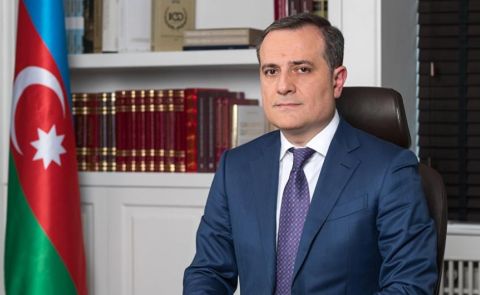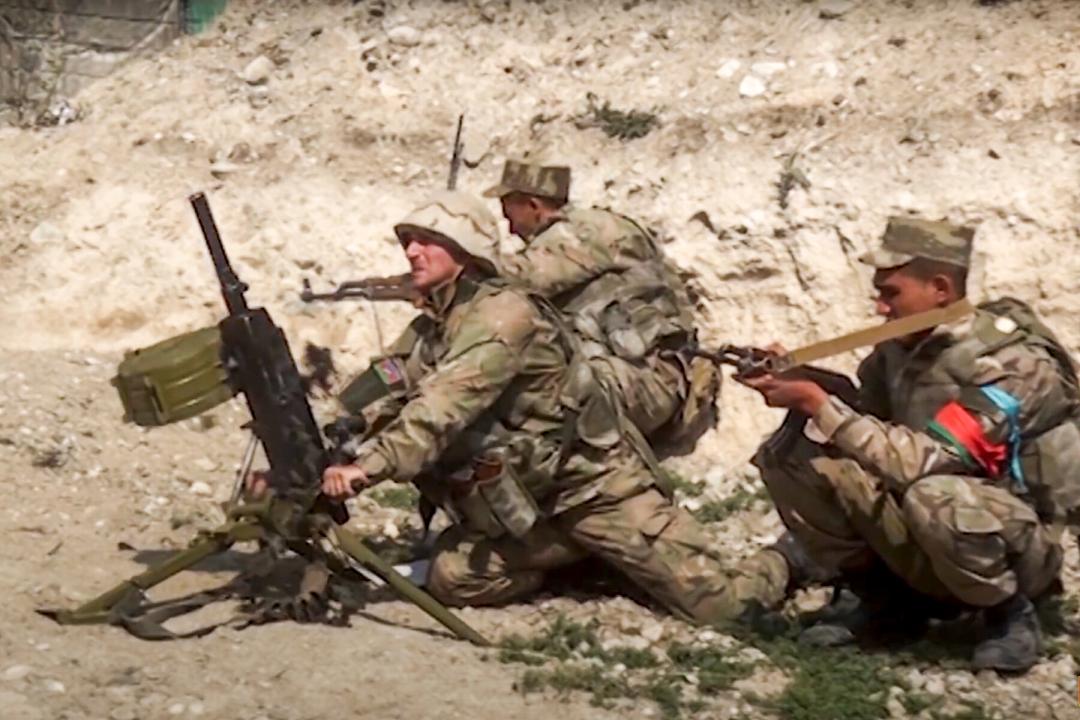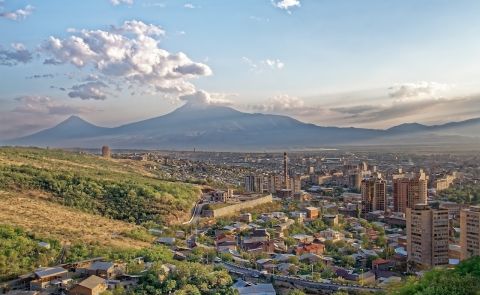
Second day of the revived Nagorno-Karabakh war

Military and civilian casualties
On 28 September, the Armenian-backed army of Nagorno-Karabakh reported intensive overnight hostilities at various sections of the Armenian-Azerbaijani line of contact around Karabakh. The army said its troops recaptured a number of positions that were seized by Azerbaijani forces following the outbreak of hostilities a day earlier.
Speaking on the outcomes, de facto President of Nagorno-Karabakh Arayik Harutunyan summarised the losses. “Yes, there are lost positions in the direction of Talish and on the south wing. There are dozens of dead, dozens of wounded. Dozens of killed and wounded among civilians. The handwriting is the same as during the April war, but the scale is incomparable,” he stated. The Nagorno-Karabakh army reported the deaths of 27 servicemen on this day, bringing the total tally to 58. It was also reported that one civilian died, other 4 were injured in Hadrut region.
As for Azerbaijan, the country's Ministry of Defence reported that the Azerbaijani Army struck Armenian armed forces artillery units targeting human settlements in the Aghdara direction and that several more combat vehicles belonging to the Armenian armed forces were destroyed in different directions of the front. In turn of civilian losses the Azerbaijani MOD reported that one person was killed and three injured as a result of artillery shelling in the Tartar region. Azerbaijan's Ministry of Defence also said that the city of Terter has been under fire from the Armenian Armed Forces since the morning of 28 September. One civilian was killed and three more were wounded.
Political developments
Armenia’s Prime Minister Nikol Pashinyan appealed to the OSCE Minsk group to increase their efforts to end the hostilities. “I call on all OSCE Minsk Group co-chairing countries and the international community to pay serious attention to the situation. Unleashing a large-scale war in the South Caucasus, on the verge of which we are now standing, can have the most unforeseen consequences. It can go beyond the region and acquire a much larger scale, threatening international security and stability. I call on the international community to use all levers of influence to keep Turkey from all possible forms of interference, which will finally destabilise the situation,” he stated.
The deputy of Armenia’s ruling the “My Step” faction, Ruben Rubinyan, stated that Armenia was not satisfied with the international efforts to prevent the outbreak of the conflict and added that the Armenian authorities are considering recognising Nagorno-Karabakh as an independent state. “I agree that the responses [of international organisations] weren’t the responses that Armenia was expecting, but I must also say that this was an expected outcome. I believe that, over the past 30 years, it has become clear to everyone that we Armenians need to rely on ourselves first, but this doesn’t mean that we shouldn’t cooperate with our international partners, and that’s what we’re doing,” he said. When asked on the possibility of Nagorno-Karabakh’s recognition Rubinynan answered that the options for recognition and a partnership agreement were being considered, adding that there are various factors and that the primary objective of Armenia’s diplomats is to present the situation to the international community and all of Armenia’s partners.
Armenia’s President Armen Sarkisyan said at the opening of the Cybersec 2020 international forum that the Nagorno-Karabakh conflict should be resolved through dialogue. “There is a platform - the OSCE Minsk Group with the participation of Russia, the United States and France. We must return to dialogue” he stated.
The spokesperson of Armenia’s Foreign Ministry, Anna Naghdalyan, stated that there is reliable evidence that Turkish military instructors are fighting side by side with the Azerbaijani army and that the military is using Turkish weapons.
Azerbaijan’s President Hikmet Hajiyev’s assistant to urged Armenia to put an end to the occupation of the territories. “This is the Great Patriotic War. There is martial law in Azerbaijan. Partial mobilisation has been declared today. Azerbaijan acts within the international law as opposed to the Armenian armed forces,” he said.
Hajiyev also noted that Azerbaijani Army is conducting defence operations in its own territory: "[Our] purpose is protecting the civilian population and forcing the occupier into peace. The purpose of the policy, pursued by Armenia so far, has been the destruction of the negotiation process and [they] achieved it. Armenia applies military, political provocations in order not to withdraw from occupied territories. It is the next aggression attempt against Azerbaijan, threatening Azerbaijan by force,” he added.
It was also reported that Azerbaijani President Ilham Aliyev had a phone call with French President Emmanuel Macron where the two parties talked about the ongoing conflict. During the call, Aliyev stated that the Armenian leadership was consciously disrupting the negotiation process. Aliyev also emphasised that Nikol Pashinynan’s statement that “Nagorno-Karabakh is Armenia” dealt a serious blow to the talks, while the statement, in Aliyev’s opinion, that “Azerbaijan should negotiate with Nagorno-Karabakh” was an attempt to change the format of the talks.
International reactions
Russia’s presidential spokesman Dmitry Peskov urged all parties to the Nagorno-Karabakh conflict to show utmost restraint. The Kremlin official also called for “the rejection of military methods of doing business” and “taking any steps that could provoke further unwanted aggravation of the situation.” Peskov also further emphasised that Russian President Vladimir Putin will hold a telephone conversation with Azerbaijani leadership “if necessary“ and that the country’s Foreign Minister Sergey Lavrov had been in constant contact with his colleagues since the beginning of hostilities. In addition, he said that the Kremlin does not see the possibility that an outside force exacerbated the situation in Nagorno-Karabakh in order to exert additional influence on Russia.
The US President Donald Trump said that his administration “is looking very strongly” into the conflict. “We are looking at it very strongly. It just happened. And I know about it. I learned about it today and yesterday. And we're looking at it very strongly. We have a lot of good relationships in that area. We'll see if we can stop it." Trump did not elaborate on how the US would try and stop the violence. The State Department released a separate statement condemning the fighting and calling on both sides to refrain from actions or rhetoric that could escalate the situation.
The former US Vice President Joe Biden stated that his country “should be pushing for more observers along the ceasefire line and calling for Russia to stop cynically providing arms to both sides, while reviewing our own security assistance programs to ensure no military capabilities are being repurposed for offensive means.” He also emphasised that “the Trump administration also needs to step up its diplomatic efforts, together with fellow OSCE Minsk Group co-chairs France and Russia, to seek a peaceful resolution and to support confidence-building measures.”
NATO's Secretary General’s Special Representative for the Caucasus and Central Asia James Appathurai also made a statement regarding the escalation of the Nagorno-Karabakh conflict. “NATO is deeply concerned by reports of large-scale military hostilities along the line of contact in the Nagorno-Karabakh conflict zone. The sides should immediately cease hostilities, which have already caused civilian casualties. There is no military solution to this conflict. The parties should resume negotiations towards a peaceful resolution. NATO supports the efforts of the OSCE Minsk Group,” he said.
The Turkish President Recep Tayyip Erdogan said that the crisis “should be ended“ and harshly criticszed the OSCE Minsk Group for failing to facilitate the negotiations. “The co-chairs of the OSCE Minsk Group have not resolved the Nagorno-Karabakh conflict for about 30 years and are doing their best not to do so and now they give advice, and from time to time they threaten,“ he said. "Is there a Turkish soldier there? Is Turkey sending weapons there? They say they are carrying thousands of trucks to northern Syria. Look at this mind, [is it] logic? It seems that the President of Azerbaijan Ilham Aliyev must be held accountable. The occupied lands belong to Azerbaijan. You have all accepted it,“ he added.
China’s Foreign Ministry stated that it hoped Armenia and Azerbaijan could resolve their differences through dialogue and hoped for calm and restraint. The ministry spokesman Wang Wenbin told reporters in Beijing that maintaining regional peace and stability was in the interests of all parties.
The Foreign Ministry of Georgia also made a public statement, saying that it is following the developments between Armenia and Azerbaijan “with concern.” “We hope that a ceasefire agreement will be reached, the sides will start negotiating and avoid more large-scale military activities that endanger the security of the entire region,” the Ministry said. Georgia also called on the co-chairs of the OSCE Minsk Group and the rest of the international community to spare no efforts to ensure the suspension of the confrontation on the ground and resumption of peace talks between the sides and declared its readiness to contribute to de-escalation of the conflict and to help establish the peace in the region.
See Also


Nordic-Baltic Delegation Meets Armenian Leaders to Discuss Regional Cooperation and Peace

Azerbaijan Strengthens Energy Partnerships with Multiple Countries

BP Strengthens Presence in Azerbaijan’s Offshore Energy Sector

Netanyahu’s Letter to Aliyev: Mutual Trust, Solidarity Following Hamas Attacks, Facilitating Dialogue Between Israel and Türkiye

